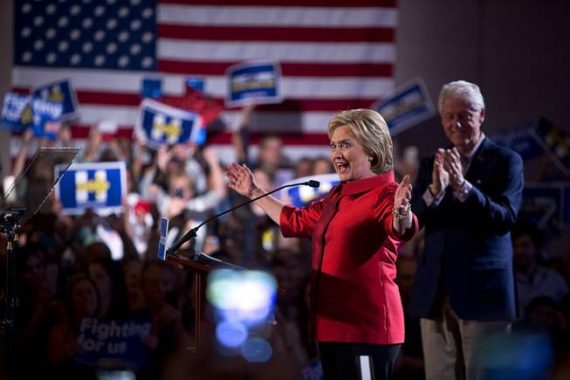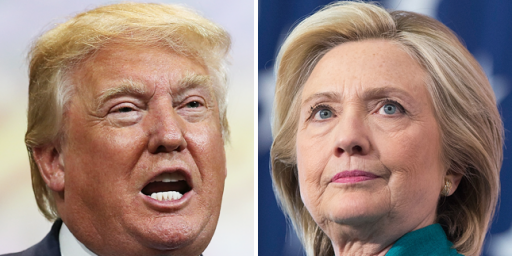Hillary Clinton Scores Decisive Super Tuesday Wins, Moves One Step Closer To Nomination
As expected, Hillary Clinton won big last night while Bernie Sanders largely floundered, thus going further toward making Clinton's victory inevitable.
As largely expected, Hillary Clinton dominated the Democratic contests on Super Tuesday thanks in no small part to her strong base of support among minority voters and other traditionally heavily Democratic demographic groups, keeping her firmly on track to becoming the presumptive Democratic nominee for President:
Hillary Clinton took full command of the Democratic presidential race on Tuesday as she rolled to major victories over Bernie Sanders in Texas, Virginia and across the South and proved for the first time that she could build a national coalition of racially diverse voters that would be crucial in the November election.
Based on results from Democratic primaries and caucuses in 11 states, Mrs. Clinton succeeded in containing Mr. Sanders to states he was expected to win, like Vermont and Oklahoma, and overpowering him in predominantly black and Hispanic areas that were rich in delegates needed for the Democratic nomination.
Mrs. Clinton, who also won Massachusetts and showed notable strength among Southern white voters, came away with a strong delegate lead over Mr. Sanders — notably larger than the one that Barack Obama had over her at this point in the 2008 presidential race.
“What a super Tuesday!” Mrs. Clinton declared to cheers at a victory rally in Miami. In her recent signature line mocking Donald J. Trump’s slogan, she said: “America never stopped being great. We have to make America whole — fill in what’s been hollowed out.”
“The rhetoric we’re hearing on the other side has never been lower,” she added. “Trying to divide America between us and them is wrong, and we’re not going to let it work.” As the crowd broke out in chants of “U.S.A.,” she said, “Whether we like it or not, we’re all in this together, my friends, and we all have to do our part.”
The contests on Tuesday were well suited to Mrs. Clinton’s strengths: her popularity with minority voters, her political kinship with Southern Democrats from her two decades in Arkansas, and her success in delegate-rich Texas in 2008. She won sizable victories in Arkansas as well as Alabama, Georgia and Tennessee, with especially big margins in counties with many blacks.
Mr. Sanders’s advisers, in turn, described Tuesday as their candidate’s most difficult moment on the primary calendar, given the diverse electorate, the relative lack of states with huge liberal populations, and the dearth of caucuses — a format that Mr. Sanders believes favors him. He won the caucuses in Colorado and Minnesota on Tuesday; Mrs. Clinton won earlier caucuses in Iowa and Nevada.
While even the poorest showing would not drive Mr. Sanders from the presidential race, his advisers said, Mrs. Clinton was already looking past her party rival on Tuesday to the leading Republican candidate, Mr. Trump, saying she was “very disappointed” that he initially refused to disavow support from David Duke, the former Ku Klux Klan leader.
“We can’t let organizations and individuals that hold deplorable views about what it means to be an American be given any credence at all,” Mrs. Clinton told reporters while campaigning at a coffee shop in Minnesota. “I’m going to continue to speak out about bigotry wherever I see it or hear about it.”
Mr. Sanders, who has also criticized Mr. Trump over the Duke endorsement, cast his ballot in the Vermont primary on Tuesday and held avictory party shortly after he was declared the winner there at 7 p.m. Choosing not to wait and see the results in other states, Mr. Sanders sounded defiant at times and philosophical at others as he spoke to a hometown crowd of cheering admirers near Burlington.
“I know Secretary Clinton and many of the establishment people think I’m looking and thinking too big,” Mr. Sanders said of his proposals for free public college and Medicare for all. “I don’t think so!”
“By the end of tonight, we are going to win many hundreds of delegates,” he predicted. “We have come a very long way in 10 months.”
The closest race of the night was in Massachusetts, where Mr. Sanders campaigned aggressively and where many liberals shared his politics and had elected his ideological ally, Senator Elizabeth Warren. But Mrs. Clinton, buoyed by strong support in the greater Boston area and working-class towns like Lowell, New Bedford and Springfield, edged out Mr. Sanders, who fared best in western Massachusetts and towns bordering Vermont and New Hampshire.
Mrs. Clinton, who won Massachusetts comfortably in 2008, visited on Monday, and former President Bill Clinton held events that night and on Tuesday.
(…)
Mrs. Clinton won about six in 10 white voters in Alabama and Arkansas, and she performed strongly in white rural parts of Virginia, Tennessee and Georgia — results that her advisers highlighted as evidence that she could do well with working-class white voters in Ohio, Michigan and other states. These voters were a key part of her base in 2008 but are now being targeted by Mr. Sanders as well as Mr. Trump.
“We have the makings of a broad-based diverse coalition that could not just power her to the nomination but make for a winning coalition in a general election,” said Brian Fallon, a Clinton spokesman. “But having said that, I think we have room to grow in certain areas.”
Mrs. Clinton herself signaled that she would be more focused on the working-class white voters who have flocked to Mr. Trump. At her Miami rally, she vowed to help lift up “struggling Rust Belt communities and small Appalachian towns that have been hollowed out” by the loss of jobs and opportunities. Exit polls by Edison Research on Tuesday night showed that Mrs. Clinton performed strongly with blacks in Virginia and Hispanics in Texas, the most powerful Democratic forces in those states, and leading with men, women and white voters.
In 2008, by contrast, Mrs. Clinton did well with white voters and had success in some states with Hispanics, but she repeatedly lost the black vote to Mr. Obama and was never able to demonstrate that she could attract a winning coalition of racially and ethnically mixed voters nationwide.
In that 2008 race, Mr. Obama narrowly beat Mrs. Clinton in delegates on Super Tuesday, which unfolded in 22 states including New York and New Jersey and featured more caucuses than this year’s contests. Mr. Obama did not secure his impregnable 100-delegate lead over Mrs. Clinton until an 11-state winning streak after Super Tuesday; Mrs. Clinton, in other words, is better positioned than Mr. Obama was to make Super Tuesday a turning point when she solidifies a huge lead over Mr. Sanders.
“We’ve always said March was a critical month,” said Joel Benenson, Mrs. Clinton’s chief strategist. “You’ve got more than 20 percent of the delegates decided tonight. Tonight was the night when the delegate count will become more paramount and will continue to be what people focus on going forward.”
Tad Devine, a senior adviser to Mr. Sanders, said the campaign stopped polling in Super Tuesday states last week to husband resources because the Sanders team did not need polls to tell them that they were facing a rough patch on Tuesday. He said that campaign advisers would huddle on Wednesday to develop strategy on the most politically advantageous states and areas to spend money in hopes of rebounding in the delegate race.
“Michigan, Washington State, Wisconsin, even New York are good terrain for Bernie’s message and for us to execute our strategy to keep competing,” Mr. Devine said of the coming contests. “And we have good terrain coming up in Kansas and Nebraska. And I think we have a real, real good shot in Maine,” which holds Democratic caucuses this Saturday but has only 30 delegates at stake.
With 11 more states behind them, Clinton advisers say her most urgent — and trickiest — task will not be to tear down Mr. Sanders, but to show him respect so that his legions of young voters and lower-income white supporters will ultimately embrace her candidacy.
Given the large numbers of southern states included in Super Tuesday this year, all of which have significant African-American populations, the scope of Clinton’s victories last night is entirely unsurprising. We already saw with her decisive win in South Carolina that Clinton clearly has this particularly important for Democrats demographic group firmly on her side, while Senator Sanders has barely managed to make a dent into Clinton’s support in these communities. This suggests that Clinton will continue to see this level of success as we head into northern and other states that are also more demographically diverse, and which have long been areas where Democrats have been successful. This includes delegate rich states like Michigan, Ohio, and Illinois, as well as Pennsylvania, Florida, and California. Clinton can also be expected to do very well in the remaining southern states such as Mississippi, North Carolina, and Maryland. Sanders, meanwhile, is likely to see his victories going forward, to the extent he has any, to states that are largely white and states where delegates are selected by caucus rather than by primary. Given the way the delegate counts work out in these states, this means that Clinton’s victory at this point is a matter of when rather than if and that Sanders will only continue to fall further behind in a race that, in all honesty, he never really had a chance of winning in the first place.
Turning to the delegate count, current estimates show that Clinton is well on her way to becoming the presumptive nominee. To date, RealClearPolitics estimates that Clinton has 543 delegates to 349 won by Sanders. Adding in the 457 superdelegates who have pledged their support to Clinton, this gives her 1,000 of the 2,382 delegates needed to win the nomination, meaning she is just under the 50% needed to nomination outright. Sanders, meanwhile, has won the support of just 22 superdelegates meaning he has 371 total delegates, or just over one-third of the amount Clinton has won or pledged to her. This gap is only likely to become larger as the coming weeks go along and Clinton continues to grab up the majority of wins and the majority of delegates. More importantly, as Nate Cohn notes, Sanders has no plausible path to victory at this point:
Mr. Sanders has big weaknesses among key blocs of nonblack voters: Hispanics; white voters in the South; affluent white voters; and older white voters. It would be very hard for Mr. Sanders to win nonblack voters by more than 20 points while facing resistance from any of these groups.
None of this means that the race ends quickly. Democratic delegates are awarded proportionally, so Mrs. Clinton would need time to clinch a majority of pledged delegates. Mr. Sanders has a loyal base of supporters who could easily fund an insurgent campaign well past the point when it is even plausible to suggest he could win the nomination.
But if the race continues as it has to date, Mr. Sanders will suffer serious losses over the next two weeks. Mrs. Clinton could approach or exceed 80 percent of the vote in Mississippi and Louisiana. She could win 60 percent of the vote in Michigan, a state where black voters represent an above-average share of the electorate. Mrs. Clinton would be poised for a clean and decisive sweep on March 15, when five big states with large numbers of black voters — Illinois, Missouri, Florida, North Carolina and Ohio — cast ballots.
Even then, Mrs. Clinton will not have a majority of pledged delegates. Only half will have been awarded. But Mr. Sanders would need to win by around 20 points from that point on to catch up.
The results tonight show that outcome is highly unlikely. There is no progressive majority for a “political revolution” in the Democratic Partywithout the support of black voters.
All of this suggests that, at some point, Sanders is going to have to ask himself if he wants to continue a race that is effectively over, or claim a victory to the extent that his presence in the race has forced the discussion of economic inequality and other issues that he got into this race to promote and work toward mending fences with Clinton with an eye toward getting a prominent speaking role at the Democratic convention.
Looking forward, the schedule remains very favorable for Clinton with primaries in Michigan, Florida, and Ohio, as well as Illinois, Missouri, and North Carolina. All of these are states that she should win easily. Sanders, meanwhile, seems to be at a decided disadvantage based on the current calendar given that, once again, many of the biggest states that will be contested are ones where minority voters will play a prominent role in the primaries. Once again, Sanders’ utter failure to resonate with any of these groups will likely prove fatal to his campaign. No matter how positively his campaign tries to spin the last two weeks, the losses Sanders suffered indicate that he can’t even seem to attract a small degree of interest among these groups. As long as that’s the case, and it seems unlikely to change, the outcome of races in those states is self-evident and Sanders’ fate is inevitable and sealed.






Remember how it was the constant refrain of Sanders critics that he’d win only Vermont?
A social studies teacher in high school (in Vermont) explained to us that the effective role that third parties have come to serve in our system is to educate.
Clinton-45 had better learn from Sanders (a glorified third-party candidate) on inequality and the economy or she will lose.
@C. Clavin:
And Clinton better remember the phrase Carville coined for her husband in 1992:
@Tillman:
There’s also the crazed proposition that Bernie Sanders, a man who was once arrested at a civil rights demonstration, was anathema to black voters, rather than being an upstart candidate running against a huge dialed-in political machine.
The reasons Hillary Clinton won are pretty obvious–she campaigned hard for the votes of a diverse party, and she had the political structure on her side. Neither of these are to her discredit, and yet the Clinton people seem incredibly defensive, as if Bernie Sanders was really the wrong candidate for this coalition. I can’t tell if it’s pure panic about how badly she did in reality versus the ideal or if there’s an overcompensation because of the other side of Hillary Clinton–her military contractor neocon buddies, her Wall Street money, her deep ties to the Rahm Emmanuels of the world. But it’s strange.
So, basically, Clinton is outperforming in states that she has a 0% chance of winning in November.
I favor Clinton over Sanders, and I don’t really doubt that she’ll emerge as the nominee barring some game-changing event like a federal indictment over the email thing, but I just don’t get the triumphalist tone of articles like this one. Last night, Clinton won 7 states, and Sanders won 4. The delegate count stands at 543 to 349 (counting superdelegates now is fairly pointless, as they almost always fall in line behind the regular delegate leader in the end). Those are not blowout numbers. Clinton is clearly leading, and her lead will most likely continue to grow, but Sanders is not out of the running at this point, and it still makes sense for him to stay in and hope for a shift to occur.
@Gromitt Gunn: Yeah, but the reverse of that is not holding a primary in states a party “can’t win.” Which, coincidentally, would disenfranchise millions of black people from determining the nominee for the party they regularly vote for. This should be universally regarded as A Bad Thing.
Besides, another constant refrain has been that primary polling/voting doesn’t translate to general election polling/voting, and that the enthusiasm gap doesn’t exist. So who knows? Maybe when the GE comes around some of those states will flip! I doubt it happens but it would be nice.
So what? I’m still voting for Bernie when the Illinois vote comes around.
Sometimes one has to take a stand, even if you know it’s not going to work.
On the 538 site, they asked an African-American contributor about what she thought was the cause for the African-Americans not to buy Sanders. She said among other things that the black community needs someone who can wrangle the votes in Congress to pass legislation or to fight for what is right. And that legislations that favor blacks are less likely to pass compared to legislations that favor whites.
Many studies will try to determine why African-Americans decided for Clinton instead. But one of the reasons is simply familiarity. The same familiarity that Sanders supporters say could help him to earn more votes as people get to know him better. Then again, there is that saying that familiarity breeds contempt. So people need to be more humble as Hillary says. 🙂
Apparently the more active the electorate is, the more they tend to buy into the political attacks on the candidates. So there is that too to explain some of the antipathy toward Hillary from many smart voters who keep up with the news. But that could also explain some of the support from minorities that Hillary gets. Perhaps they are just less politically active than others.
And I think minorities are perhaps less active politically as a result of divide and conquer that the majority operates. Minorities are left to fend for themselves, less united than people would have expected.
Hillary is the Dems Nixon. The server was based on a paranoia about “the vast rightwing conspiracy out to get me”. She won’t release the tapes…er transcripts with the infantile argument of “I will release them, if everyone else does”. The last time that worked was in 2nd grade.
She is overly secretive (Rose Hills biling records) insecure in her own skin, socially awkward and completely inauthentic. Bill serves as the “JFK” in her life. The guy who is “well liked” but who she knows is fatally flawed and it surely must drive Hillary crazy that he still holds great affection in the party.
In the end, she will be indicted (lets be honest people, the private server was to foil FOIA requests) and impeached by the wingnut crazy Congress and the country will once more be plunged into the abyss of the Clinton dysfunction of scandal and subterfuge.
The GOP finally, through a madman, destroyed the Bush dynasty and the nexus between the country club ruling elite and the coalition of gun freaks, Bible thumpers and blue collar high school workers.
Too bad the Dems will nominate Hillary Milhouse Clinton and not the honorable Bernie who much better represents the type of New Deal, old liberal policies which transformed this country.
@Tillman: I live in Texas, so I see the state of the party here first-hand. I’m not saying that the Democratic Party shouldn’t hold primaries here, but I am saying that political reality is that my vote in the primary will not have any effect on the eventual outcome of how my state’s Electors vote in November
In effect, so long as the Electoral College exists, my preference for the Party nominee should be irrelevant to the eventual selection at the convention, as should the preferences of Democrats in Massachusetts. The question asked *should* be “Which candidate will maximize the Party’s chances of getting to 270 electoral votes?”
@Gromitt Gunn: Addendum: In my county, Sanders beat Clinton. Both got fewer votes that Cruz, Rubio, or Trump. The R:D ballot ratio in yesterday’s election was more than 4:1.
@R. Dave:
The problem comes into play mainly through a few key points:
1) There are several states left (Mississippi, Louisiana, possibly Florida and North Carolina, among a few potential others) where Clinton can be expected to post blowouts.
2) There aren’t really any states left in which Sanders can be expected to post blowout victories. From here forward for him it’s likely to be mostly moderate wins or ties, best case. Even California is polling +13.5 Clinton at present, and New York has closed primaries.
Proportional allocation will be IMO what eventually kills him, as he won’t be closing the delegate gap quickly enough. She’ll be picking up delegates at the same time that he is, and in those blowout states she has left she’ll just expand her lead further.
If the Dems switched at some point to winner take all, I’d agree that he had a shot at being nominated. Since they don’t, and it’s proportional allocation all the way to the end, I’m not seeing an opportunity for him to close the gap before she hits a mathematical lock.
Once she does, the remaining superdelegates will largely coalesce behind her, and that’ll be the ballgame.
@the Q:
There is some truth in the Clinton/Nixon analogy. Both were centrist pragmatic deal makers. Both were more hawkish than I like. Both have a strain of paranoia and secrecy. Clinton doesn’t have the Nixon bigotry and knows were the line is on legality. There won’t be any criminal liability attached to anything associated with the emails. If the congress foolishly decides to impeach there will be no conviction in the Senate and it will just be another of their circus shows for the rubes.
With Sanders they won’t have that ready made controversy, but as with Obama, they will quickly find something and there will be the same gridlock. Clinton is better at playing hard ball and making deals to get incremental change than Sanders is. Sanders if nominated would most likely be a McGovern and in the even less likely event that he is elected would be another Carter (honest, well meaning, and completely inneffectual).
@Grewgills:
She also lacks the foreign policy skill, in my opinion, particularly with the Russians and Chinese. For all of Nixon’s domestic warts, I just can’t feasibly imagine him ever allowing Russo-US relations to deteriorate to this point. Hillary and the “reset”…
@the Q:
All well and good, but someone needs to win 270 electoral votes, and HRC stands a much better chance of doing than Bernie. I don’t like it, but that’s the way it is. And she also has some semblance of reality with how the world works, nice and cold. She’s far from an ideal template (that would be Nixon or Bush Senior for me-you don’t know how freaking weird it is to be joining forces with ex-McGovernites), but at least she doesn’t seem to think that singing The Internationale with Putin will repair our relations with Moscow.
I’ve converted to Sanders, but that’s basically all because of domestic issues in spite of my rampant obsession with foreign policy. I hate saying that, because Hillary Clinton in many ways represents everything I despise about 60s Baby Boomer liberals, but there you go.